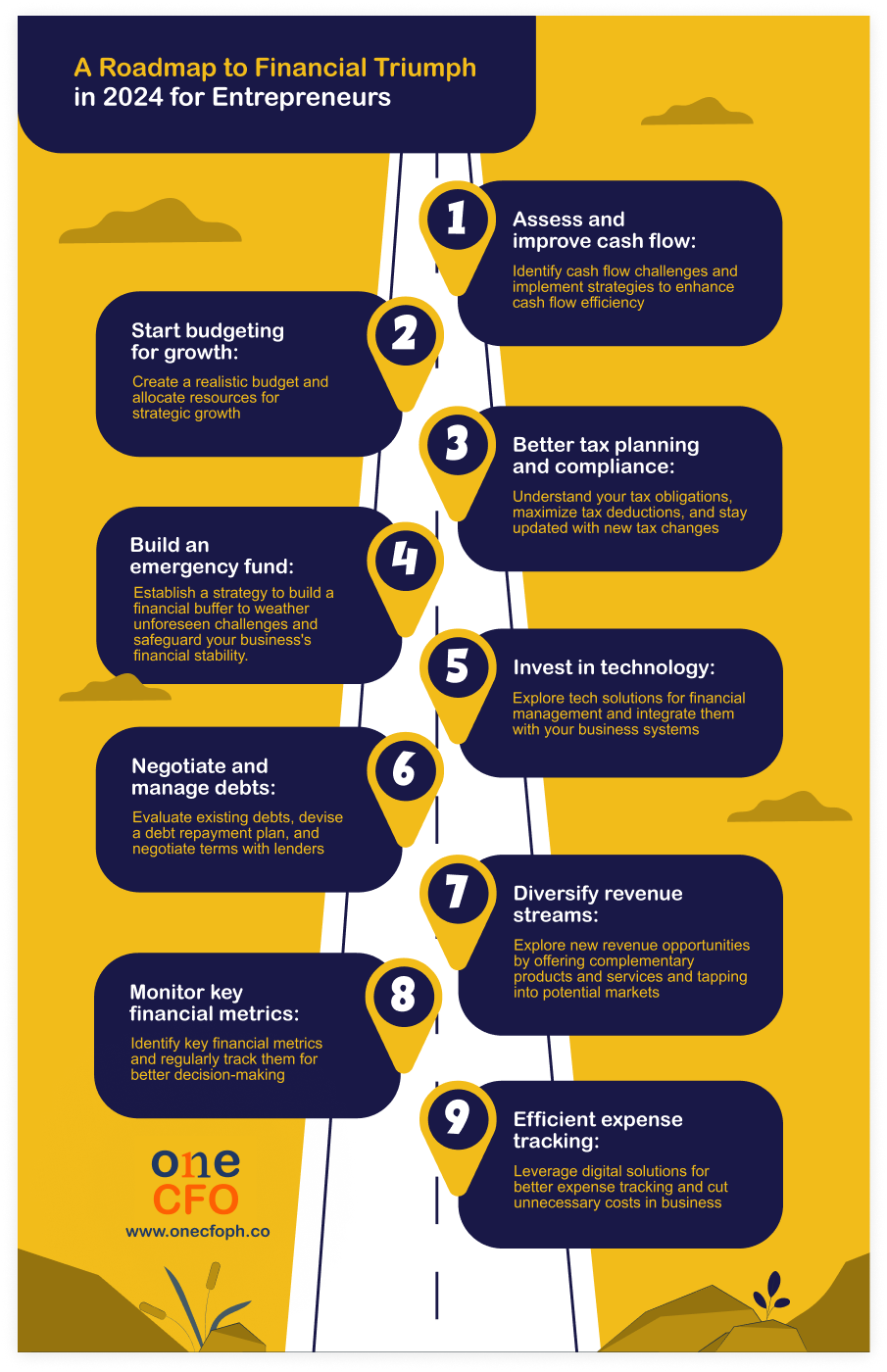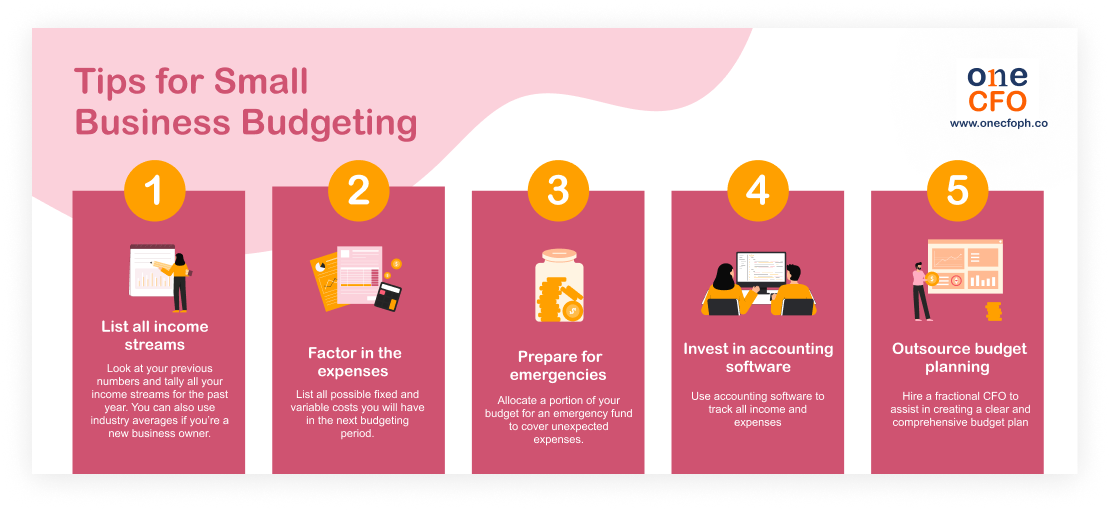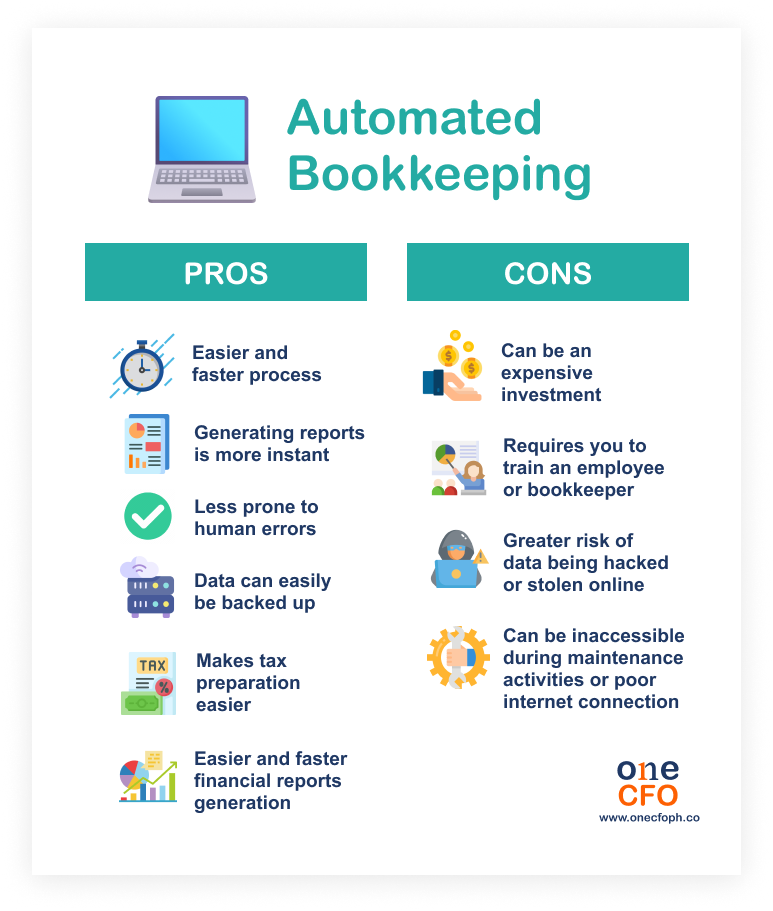
January 2, 2024 | 9:03 pm
Table of Contents
To ensure a thriving 2024, every entrepreneur must craft impactful financial resolutions.
Contrary to popular belief, making financial resolutions isn’t just a cliché; it's the
compass guiding your business toward resiliency and success.
As we bid adieu to the past year, it’s time to reminisce and pave the way for a more
flourishing future. Enter 2024 armed with goals and actionable plans to elevate your
business.
Take a closer look at the nine straightforward financial resolutions that will elevate your
business to new heights this year. From fine-tuning cash flow strategies to optimizing
budgets and mastering tax planning, we have the practical insights to make resolutions that
truly stick and are achievable.
Discover the game plan for a flourishing 2024 - where your business doesn’t merely get by
but truly excels. Seize the opportunity to set the perfect tone for your business finances.
Kickstart your success now!
What resolutions should entrepreneurs make in 2024?

#1 Assess and improve cash flow
An entrepreneur's typical New Year’s resolution might lean toward generating more profit
this year. However, it is equally crucial for business owners to prioritize the meticulous
management and enhancement of cash flow.
The first step to improving cash flow is identifying the
challenges your business faces
regarding the matter. Do you frequently encounter delays in payments from your customers? Or
are you faced with challenges related to timely payments to your suppliers?
Once you pinpoint the prevalent cash flow issues in the business, you can create ways to
eliminate them.
How can I enhance the cash flow of my business?
A common strategy for enhancing cash flow efficiency is incentivizing customers to pay early
by providing discounts.
Business owners can also negotiate better credit terms with
suppliers to give them more time
to collect the money they need for payments.
Another option is to set up automated alerts of their payment deadlines to avoid being late.
Similarly, they can send automatic invoice reminders to customers to encourage them to pay
on time.
After putting all strategies together, it’s time to formulate your cash flow management
plan. Developing this plan will solidify the changes you want to implement and give you
clear targets for a better year.
Dive deeper into financial mastery. Hit the play button to uncover the expert tips on
mastering cash flow management.
#2 Start budgeting for growth
Leveling up your business this 2024 requires more than just a vision - it’s about strategic
budgeting for growth.
A business budget isn’t simply a
number you set - it also serves as a roadmap for
decision-making and goal-setting. Budgets allow business owners to monitor expenses better,
mitigate financial risks, and promote overall transparency within the company.
But first, how do you effectively craft a budget that fuels your business to new heights?

When creating a realistic budget, you must consider
how much you typically earn and spend in
a year. It’s best to look at historical data in the business or research industry standards
to increase accuracy.
In addition, think about the worst- and best-case scenarios when budgeting to prepare
yourself for changes in the business landscape.
Another key aspect of budgeting is knowing how to allocate resources for strategic growth.
Allocating funds to invest in cutting-edge technology, expand marketing efforts, and enhance
your employees’ skill sets fosters innovation and adaptability. These deliberate budgeting
strategies serve as the fuel propelling your business to new heights.
Watch this video to get insights on how to make budgeting easy for your small business:
#3 Better tax planning and compliance
Working on taxes might be less exciting, but it's crucial to success in 2024.
For better tax planning, you must be familiar with your small business's specific tax
obligations, which mainly depend on your legal structure. Knowing the
different
requirements, deadlines, and types of taxes you must pay will prevent you from getting
caught off-guard and penalized.
Being informed of your obligations is only the first step in tax planning. Aside from that,
business owners need to practice good bookkeeping to avoid errors in
filing taxes and easily
access financial records when required.
Furthermore, it's also best to explore tax deductions tailored to your
business to save
money. This proactive approach minimizes your tax burden and frees up funds for crucial
investments, such as upgrading equipment, hiring additional talent, or expanding operations.
Lastly, businesses need to be vigilant and stay abreast of updates from the BIR regarding changes in tax regulations. Staying compliant demonstrates good corporate citizenship and mitigates potential challenges in your business operations.
#4 Build an emergency fund
Emergencies and problems arise, whether we like it or not. And sometimes, they even happen
when we’re the least prepared.
To mitigate this in 2024, it’s essential to always have a financial safety net in the form
of an emergency fund. An emergency fund is a cash reserve of three to six months of business
expenses.
This fund is a game-changer - it gives you peace of mind and weather through any low points
in the business. It becomes the business’s buffer during downturns and unexpected shifts in
the market.
Building an emergency fund requires a systematic approach. One way to do this is to
calculate your monthly expenses, set a savings goal, and make consistent contributions.
In addition, you can also incorporate emergency fund savings into your budgeting to ensure
you can add to it regularly.
#5 Invest in technology
Another resolution business owners should have on their list is embracing new technology
solutions for financial management.
This 2024, it’s time to say goodbye to manual tracking with notebooks and spreadsheets.
Start transitioning to intuitive accounting software like Xero or ERP systems like Britana,
which tracks your financial and accounting activities and gives you insights for
decision-making.
Using technology and digital tools makes financial management much more efficient. With
these tools as your partners, you can instantly automate bookkeeping, invoicing,
payment
reminders, financial reports, and more - saving you more time and money.

Aside from automating tasks, you can integrate accounting software and ERP with bank
accounts and CRM software to streamline financial processes.
For example, accounting software automatically pulls sales data from the CRM to give
business owners real-time financial snapshots whenever needed.
#6 Negotiate and manage debt
Navigating business debts is a strategic aspect of financial management, often a necessity
for business growth and profitability. The key lies in adeptly managing and negotiating
these financial obligations.
Begin by assessing your business’s financial standing with the latest balance sheet. This
comprehensive review sheds light on the debts and liabilities, providing a foundation for
crafting a strategic plan.
Review every debt's interest rates, repayment terms, and overall loan structure. Also,
incorporate all scheduled debt payments in the budget and cash flow projection for a
comprehensive financial outlook.
When meeting debt payments becomes challenging, proactive communication with lenders is
paramount. Negotiating favorable terms, such as reduced interest rates or extended repayment
periods, can alleviate financial strain.
When settling debts, always make sure to have a plan in place. Continuously monitor debt
portfolio to gauge borrowing patterns, prioritize high-interest debts, and allocate
resources accordingly.
#7 Diversify revenue streams
Another crucial business resolution is diversifying revenue streams to grow your business
further. Relying on only one product or service is good when starting.
Still, to increase your business longevity and sustainability, you must diversify. Multiple
income streams can stabilize the business and help weather economic uncertainties.
One way to approach this is to investigate your current offerings and see if there are
complementary products or services you can add. For example, a baker selling customized
cakes can also sell flowers on the side so that customers can combine these cakes and
flowers as a perfect gift!
Business owners can also tap into emerging markets by working with businesses that
complement theirs. For example, small businesses can expand their reach with e-commerce
platforms like Shopee and Lazada.
However, carefully evaluate the risks and rewards linked to diversification, adopting a
strategic approach to prevent the pitfalls of selling various products without overextending
your business. Striking the right balance is essential to maintain operational efficiency
and sustain growth while exploring new opportunities.
#8 Monitor key financial metrics
For a better business in 2024, entrepreneurs should also monitor the key financial metrics
they need for success.
There are a lot of financial metrics you can track, but
if you’re only starting, tracking
them all at once can easily overwhelm you.
Small businesses should prioritize monitoring key financial metrics such as revenue growth
rate, profit margin, cash flow, return on investment (ROI), and accounts receivable
turnover.
These metrics offer critical insights into income generation, cost management, liquidity,
investment efficiency, and cash collection processes, guiding informed decisions for
sustainable financial health and growth.
How often are metrics tracked?
Apart from knowing what to track, consistency is also important. Monitoring key financial
metrics should be an ongoing commitment and routine. Business owners can check these weekly,
monthly, or quarterly to catch trends and assess if the business is performing as expected.
These metrics are not just numbers; they’re your guides. Monitoring and measuring financial
metrics allow business owners to make data-driven decisions to steer their business toward a
more strategic path.
#9 Efficient expense tracking
For our final New Year’s resolution, businesses must comprehensively analyze their financial health and growth trajectory. This assessment not only sheds light on the business's profitability but also reveals whether your expenses are well-aligned or if there’s an issue with a high cost of operation.
A comprehensive assessment of why your business is not making money can pinpoint expenses
not working for your business or if it's lowering your revenue - Are there subscriptions you
no longer use? Can you negotiate cheaper prices from suppliers?
The key to efficient expense tracking is ensuring each penny you use contributes to the
growth of the business. This involves implementing effective expense monitoring systems and
identifying cost-saving opportunities.
Furthermore, analyze your previous costs, see where you may be overspending, and allocate
resources more effectively.
Leverage digital solutions that streamline monitoring expenses to make it more efficient.
An example is switching to automated bookkeeping to speed up data entry, categorize
expenses, and give you more insights into where your money is going.
How do you stick to New Year’s financial resolutions?
Every new year is a chance to improve and bring your small business to greater heights.
Implement the top nine financial resolutions we provided and make 2024 the most successful
business year you have to date!
If you need more guidance on sticking to these financial resolutions and other best
practices, OneCFO is here to guide you.
OneCFO is your
partner for growth, empowering small businesses and startups so you can start
the year with a bang and keep growing from there!
Aside from helping you with bookkeeping, taxes, and payroll, OneCFO also provides CFO-level
insights that could change the game for your business.
Explore the possibilities with OneCFO by visiting us at onecfoph.co or reaching out to us at
[email protected].
Read our disclaimer here.